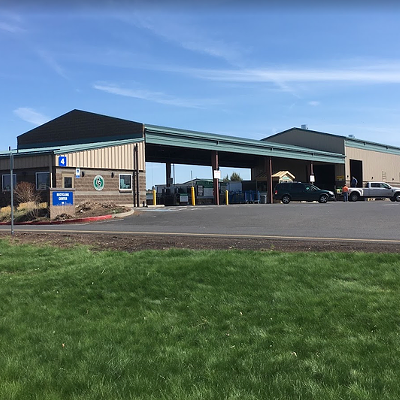The sidewalk that lines the north side of Galveston Avenue on the westside of Bend is one of the more well-traveled stretches of pavement in the city - moms pushing strollers, workers heading downtown, and, of course, those ambling to and from bars and eateries. Now, many of those pedestrians stop right around 12th Street, whether it's because their dogs go ballistic or just because of their own curiosity. This is all because, less than two feet from the sidewalk, there's a makeshift chicken pen with three inquisitive occupants peering at passersby.
Chickens next to a busy sidewalk in an increasingly busy neighborhood? It might seem bizarre to the uninitiated, but it's actually indicative of a trend that's popping up throughout Bend: urban chicken coops. The most visible display of this trend happened earlier this spring, when nearly 1,600 Bendites got in their cars and hit the road for Bend's First Annual Chicken Coop Tour. Modeled after coop tours in larger cities like Portland and Seattle, Bend's tour included 26 coops, most of which had fewer than four fowl in them. To participants, however, quantity didn't matter. Everyone - from children and hipsters to parents and the elderly - were enthralled by even the smallest makeshift coop and its roosting residents.
The tour and the surprising interest in it are part of a larger urban chicken uprising that is turning urban and suburban families across the country into backyard chicken farmers. And Bend-area hobbyists are rapidly joining their ranks. While chickens have been prevalent in backyards across the world for centuries, providing eggs, companionship and sometimes meat, in the U.S., poultry has been relegated to farms and mass production facilities.
But in a trend that is notable for its historical irony, fowl-minded citizens across the country have been petitioning to get chickens back into their yards and their lives. And it's worked - cities, including Portland, Seattle and yes, Bend, have changed their laws to allow backyard chickens.
In 2006, Bend changed its city ordinance to allow homeowners to own up to four chickens if they live on a residential lot at least 6,000 square feet in size. Cheryl Howard, an active neighborhood organizer who lives in the Orchard District east of the parkway and north of Pilot Butte, was a key community voice in changing the law.
"Chickens are highly intelligent and very sweet," says Howard, who admits she may have had a few "feral" chickens that lived in or near her yard before the law was changed. "They also add to our sustainable living practices."
Tania Piper, whose eastside coop was one of the stops on Bend's coop tour, also enjoys the local food benefits of her four chickens. "I want to grow my own food," says Piper, who also cultivates greens and root vegetables in her backyard. "I want to see where it's coming from - I don't want to have to go to the store and say, 'I don't know where this is from.'"
The local food movement is one of the most cited reasons people keep chickens. There seems to be a country-wide desire to keep food sources local and it doesn't get more local than eggs plucked right from your backyard from chickens you fed and cared for yourself.
Right now, chicken owners need a city permit to have chickens, but that may soon change. Colin Stephens, Bend's planning manager, says the city will have a meeting to decide whether to eliminate the need for permits. Howard supports this measure. As Howard says, "Quite frankly, I have a 160-pound Great Dane whose environmental impact is much more substantial [than my chickens] and I don't need a permit for my dog."
If anyone needs an indicator as to how popular this phenomenon has become, the Chicken Coop Tour provided just that. Liz Lotochinski, who has 20 hens and a rooster (along with a dog, cats and horses) on her spacious piece of land in Tumalo, organized the tour. Lotochinski heard about coop tours in other cities and thought Bend needed its own tour. For potential chicken owners, she says, first-hand experience is invaluable.
"Without seeing a real live feathered hen, you're intimidated," she says.
Lotochinski put together a grass-roots effort for the tour, which was surprisingly successful. All in all, it raised nearly $3,000 and hundreds of cans of food for local charities.
Other events have been piggybacking on the urban chicken trend. Celebrate the Season, a local farm and garden store that also builds chicken coops, sponsored a showing of the independent film, Mad City Chickens, at the 2nd Street Theater. The film, which documents the legalization of urban chickens in Madison, WI, drew a sellout crowd. The response was so huge that Celebrate the Season decided to do a repeat showing.
Beyond eggs and meat, backyard chickens have many practical uses. The manure can be used in gardens, their eggs for food and they eat pests like bugs and mice. But there's another less quantifiable attraction to chickens - companionship. And like dogs and cats, chickens have their own following.
"There are definitely chicken people," says Howard. "Ours have names and we've had them since they were chicks and we would never dream of eating one."
"There's this mutual respect and adoration," says Lotochinski, who likens the interest in chickens to the hubbub around the recent National Beard and Moustache Championships at Les Schwab Amphitheater. "I'm sure some of the beard and moustache participants don't give a rat's ass about a chicken or a rooster. I have absolutely no desire to go see a man with facial hair. But we [chicken people] are a community. Just like the gay community. It's an underground chicken community."
And now, with Bend's new laws, they can proudly show off their birds.





















